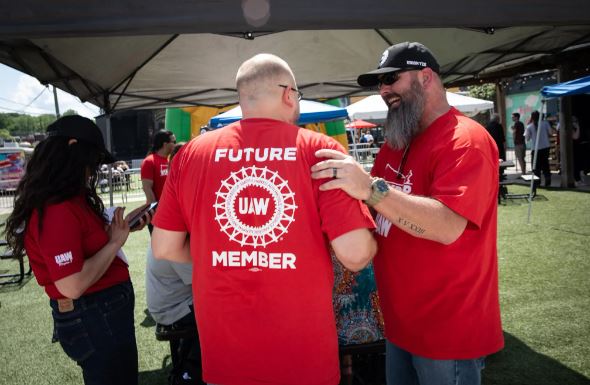A week after a narrow defeat in union elections at two Mercedes-Benz factories in Alabama, the United Automobile Workers (U.A.W.) requested a new vote from federal officials, citing allegations that the German automaker engaged in unlawful activities to undermine union support. The union accused Mercedes-Benz of executing a “relentless anti-union campaign” marked by significant legal violations, according to a complaint filed with the National Labor Relations Board (N.L.R.B.) on Friday.
The U.A.W.’s complaint alleges several aggressive anti-union tactics by Mercedes-Benz, including the termination of four pro-union employees, restrictions on union campaign activities, and the coercion of employees through mandatory anti-union video screenings. These actions, the U.A.W. contends, contributed to the workers’ decision to vote against union representation.
In the recent election, workers at the Mercedes plants near Tuscaloosa, which produce sport utility vehicles and battery packs, voted 56 percent to 44 percent against unionization. However, the N.L.R.B. has the authority to mandate a new election if it finds that employer misconduct significantly influenced the vote outcome, explained a board spokeswoman.
The U.A.W.’s strategic focus on organizing workers in Southern states stems from the region’s growing importance in the automotive industry. The South has been attracting a considerable share of the multibillion-dollar investments that companies are making in electric vehicle and battery manufacturing facilities. Successfully unionizing these plants is seen as crucial for the U.A.W.’s broader goal of maintaining and expanding its influence in the rapidly evolving automotive sector.
However, the union faces stiff resistance from Southern political leaders, who generally view unionization efforts as a threat to economic growth and job creation. Alabama’s Republican governor, Kay Ivey, and other regional leaders have historically worked to keep unions out, believing that a union-free environment is more attractive to businesses looking to establish new operations.
The recent U.A.W. efforts at the Mercedes-Benz plants in Alabama are part of a broader campaign to increase union representation in a region traditionally resistant to organized labor. The union’s push comes amid a nationwide resurgence of labor activism, driven in part by growing economic inequality and workers’ desires for better wages and working conditions.
The N.L.R.B.’s decision on whether to grant a new election at the Mercedes-Benz plants will be closely watched. If the board finds sufficient evidence of employer misconduct and orders a new vote, it could set a significant precedent for future unionization efforts in the South and beyond. Conversely, if the board dismisses the complaint, it would represent a significant setback for the U.A.W. and other unions seeking to expand their footprint in the region.
The outcome of this case also has broader implications for labor relations in the United States, particularly as the country navigates the economic shifts brought about by advancements in electric vehicle technology and the increasing importance of battery production. The U.A.W. remains determined to challenge what it perceives as anti-union tactics and to advocate for the rights of workers in all regions, regardless of historical union affiliations.
The U.A.W.’s recent request for a new election at the Mercedes-Benz plants in Alabama underscores the ongoing tensions between labor unions and employers, especially in the rapidly changing automotive industry. The resolution of this dispute will likely have significant implications for the future of unionization efforts in the South and the broader labor movement in the United States.

